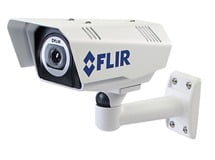YES, we like thermal cameras at SE&N and FLIR’s new FC Series S represents a firm push by the market leader to bring its technology within reach of a much wider market base. Why do we like thermal? Because it works. If security teams need to monitor, manage, confirm and respond to intrusion in all conditions, thermal cameras offer spectacular performance.
The use of thermal cameras isn’t confined to manned sites, either. We also think thermal cameras can allow investigators to confirm events at long range in challenging environmental conditions, giving them an opportunity to respond to developing threats on unmanned sites, either with target hardening or police or patrol response.
As part of a wider surveillance system, thermal also offers excellent support for optical video cameras that are necessarily operating at closer ranges to give face recognition. The latest generations of networked thermal cameras reporting alarm events in real time via text, email or alarm input are pretty much security officers with bionic eyes, in my opinion. With ranges of up to 300m or so and wide viewing angles, they really are the goods.
FLIR’s affordable FC-Series S network-ready camera is more expensive than standard optical surveillance cameras but it’s the guarantee of detection you get with thermal that makes this money well spent. Also important to take into account is the fact that with thermal there’s no lighting requirements.
You can buy the FC-Series S thermal camera in 2 resolutions – 640 x 480-pixel, and 320 x 240-pixel formats and there are variety of lenses to suit a range of applications. Pretty obviously, longer lenses have a tighter field of view and allow you to peer deep into a scene, while shorter lens are best for wide angle work – car parks, warehouses, after hours sports arenas and the like.
A particular strength of thermal cameras is their wide dynamic range though you need to understand what this is from the point of view of the microbolometer. Thermal cameras aren’t giving you face recognition that might be obliterated with bloom or flare in a scene, but because they detect heat it’s vital they not be blinded by hot sun.
You want your thermal cameras to discern between different heat sources and offer you the best possible thermal contrast between say, a warm reflection from a window and a person standing in front of the window. Obviously the best ‘seeing’ conditions for thermal cameras are cooler so FLIR’s ability to offer excellent contrast in tough conditions is vital. This strong contrast performance makes the FC-Series S a strong performer in support of video analytics.
FLIR’s FC-Series S is a PoE camera with communication and power through a network cable. Same as any IP camera this means the FC-Series S can slotted into a networked surveillance solution with ease. Compliance with ONVIF 2.0 means the camera will work with a range of compliant management solutions. You get multiple channels of streaming digital video in H.264, MPEG-4, or M-JPEG formats. And simultaneous digital and composite video output is possible using the network and analogue connections.
For single camera installations the FC-Series S comes with a single sensor copy of FLIR Sensors Manager. This intuitive software allows users to manage and control an FC-Series S camera in a TCP/IP network.
There’s analogue connection too, for installation in legacy networks, with power-in/video-out capability.
Same as all FLIR products, the FC-Series S is tough. The cameras are IP66-rated and have an temperature range of -50ºC to +70ºC. A sun and rain shade helps protect the camera in outdoor installations. If anything does go wrong, FLIR FC-Series S thermal imaging cameras are covered by a 3-year warranty on the camera and a 10-year warranty on the detector.
“The latest generations of networked thermal cameras reporting alarm events in real time via text, email or alarm input are pretty much security officers with bionic eyes”









